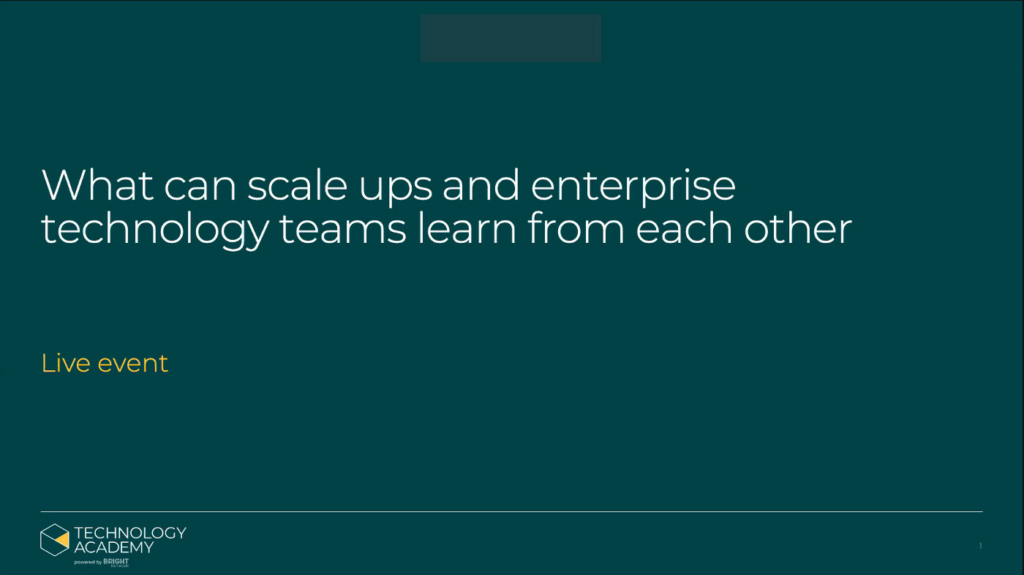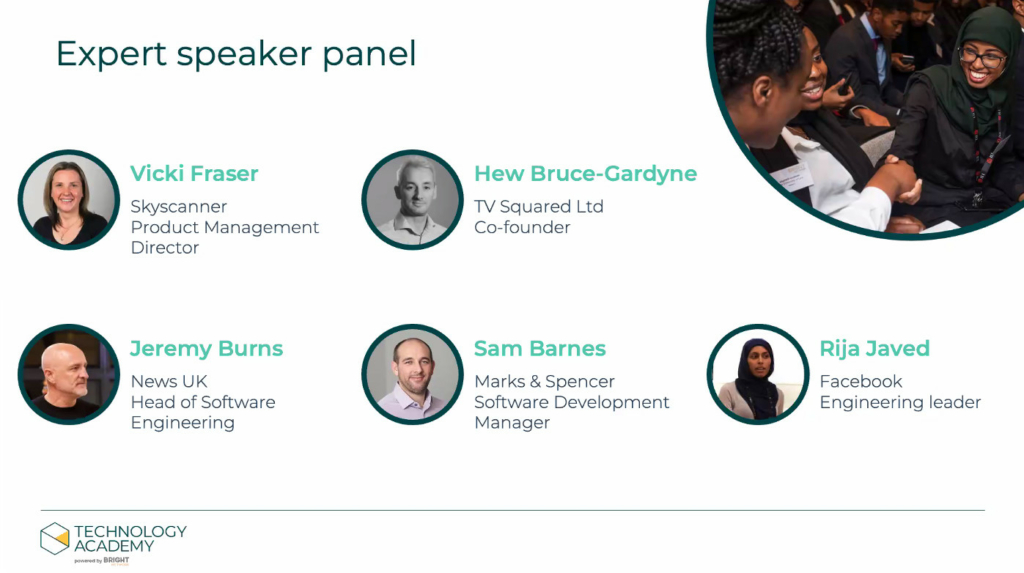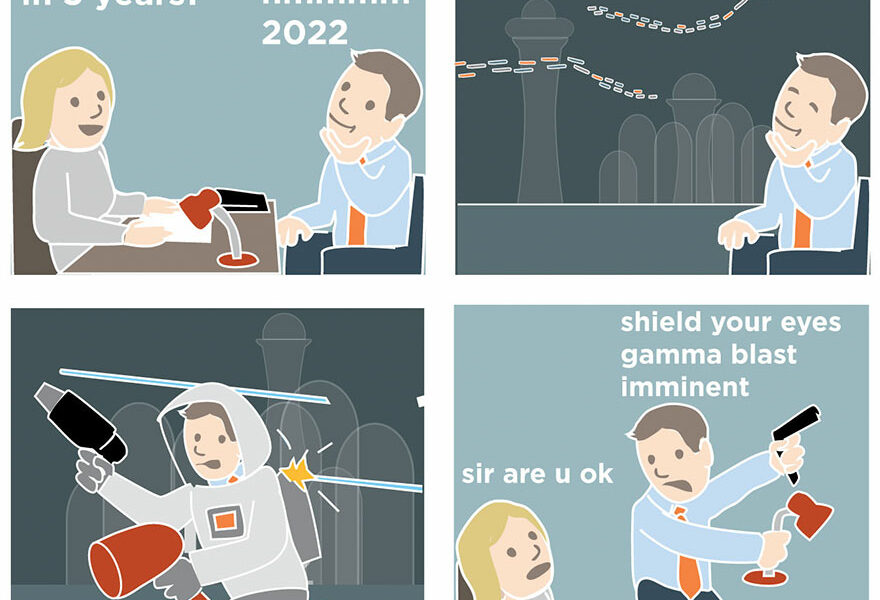I was recently asked to be on a panel, hosted by Thomas Brightwell, CTO at Bright Network and entitled ‘What can scale-ups and enterprise technology teams learn from each other.’ It was a really good panel and having previously worked in small, medium and now enterprise companies, I felt well placed to give my own views on the topic.

Also on the panel was:
- Rija Javed, Engineering Leader at Facebook
- Vicki Fraser, Product Management Director at Skyscanner
- Jeremy Burns, Head of Software Engineering at News UK
- Hew Bruce-Gardyne, Co-founder of TVSquared Ltd
If you’re interested in having me participate in any panels, please send me a message.
How do enterprises continue to leverage the creativity and innovation which software engineers naturally bring?
- Ensure they retain the passion and spark that first got them into an engineering career.
- Don’t allow them to be considered purely feature delivery robots.
- Try to not let them get bogged down in enterprise bureaucracy and politics.
- Invest in their growth and learning so they’re always evolving at your company.
- Empower them as much as possible, give responsibility to them.
- Foster a culture where creativity and innovation are encouraged and rewarded.
- Change the engineer’s mindsets from ‘serving the business’ to serving customers’
- Have regular hackathons with no theme and some with themes.
As you grow, how do you handle the need for structure and some hierarchy without breaking the flat structure which engineers typically enjoying working in?
- As you grow, no matter what, your company simply won’t remain the right place for everyone. Expect and plan for that as it takes many by surprise.
- Hierarchy is a natural need as you scale but you can achieve a feeling of things being flat by instilling very high levels of shared values and mutual respect between people and leaders.
- Values like M&S’ ‘Talk Straight’ and asking everyone, regardless of rank, to always be a good citizen in all your behaviours and interactions with people
- Incentivise and reward behaviours like integrity, humbleness and humility and ensure leadership embody these at all times.
- Ensure all leaders are always approachable by all colleagues
- Constantly watch for the tone of reactions to failure and do everything to foster a culture where reactions are not toxic, don’t roll downhill and people don’t become fearful.
How do you get people outside the technology team excited and engaged with what’s happening on the technology roadmap? Are there any differences that you’ve seen between scale-ups and enterprises? What changes as you grow?
- Marketing, marketing and marketing.
- Publicise, socialise and shout about your technology roadmaps to as many people as possible and resist the urge to stop because it feels like you’re a stuck record.
- Marketing is often a weak spot for technology folk and doesn’t come naturally to them but it’s a required key skill if you want to attain the ideal of product and technology being equal partners.
- Watch and learn from those who are typically stronger and communications, such as product functions, Account Managers or even salespeople.
- Keep the language of your technology roadmaps as non-technical as possible and always align it to business and customer value.
What makes a high performing technical team and how do you build one?
- First, you need to define what high performing is, it’s different for each company.
- For example, delivery focussed agencies often define high performance in a different way to large in-house product companies.
- Hire the teams and people to fit the organisation as there is no one blueprint for all.
- Hire people with different viewpoints but shared values e.g. accountability, passion, pride, humility and creativity.
- Let teams create their own identity, values and objectives. The more you can empower teams, the more they’ll delight you.
- Coach and mentor teams with the sole aim of making yourself redundant in that role. To the point where they don’t need you anymore and hold themselves fully accountable for quality, delivery and self-improvement.
Now that Covid has driven us to remote working, how important is the role of face-to-face for engineering teams in terms of collaboration, problem-solving and whiteboarding? How much of this can be done remotely?
- For people management, having videos on during calls is crucial for reading people’s facial expression and body language and building rapport.
- Understand that each person feels differently about office time and people interaction.
- People tend to mistake the best way of working with their own preference.
- The future is remote, so don’t regress into back the office when encountering challenges be dogged about making remote and hybrid working models more effective.
For both scale-ups and enterprises what is the best way to make use of contractors? Any tips?
- Always assess new contractors as you would a new permanent team member.
- Contractors have just as much ability to be problematic yet are often lightly assessed.
- Assess their technical skills but also their attitude.
- Try not to use them on a long-term basis.
- Retain regular contact with good contractors for future collaboration.
- Always ensure they’re working to your patterns and standards.
- Be wary of people looking to build up their CV at your expense.
- Try to convert good ones to permanent team members.
How important is it to have a technology founder or co-founder to drive a high functioning technology organisation and culture?
- Ideal but not necessary.
- A strong CTO or technology leadership team can do the technology areas justice by being good at influencing, collaborating and thus garner respect from all non-technical parties.
- Without respect, there will always be a constant battle between commercial and technology when they should be equal partners.
- Technology functions need to constantly demonstrate value in order to be trusted.
- Value is not always something new and shiny but is often the lack of critical fires happening for weeks or months at a time. This is the result of hard work but often goes under the radar.
When people make a career switch into a technical leadership role, from a non-technical background, how important is it for them to build up their technical credentials?
- It’s ideal to build up tech credentials but not always necessary.
- It depends on the type of leadership role they’re moving into.
- What’s more important in technical leadership is foundational technical knowledge and an ability to understand technical landscapes, scenarios, people and context quickly.
How do you foster a culture of continuous learning?
- Hire people who are passionate about learning and sharing knowledge.
- You can do lots to foster a continuous learning culture but without the right people, it’s a non-starter.
- Makes sure continuous learning has complete buy-in from leadership and product and not done under the radar.
- Being an engineer is not just about delivery but a healthy mix of delivery and learning. That’s how to cultivate great sustainable teams.
- It has masses amounts of value to both individual and company and this should be demonstrated and understood.
- Ensuring that people are constantly sharing new knowledge they attain and foster a knowledge-sharing culture too.
How can you retain self-motivated engineers and technologists?
- Have a truly healthy engineering culture where people are given problems to solve, the empowerment to solve them and hold themselves to account as much as anyone else.
- Create a company where engineers are the biggest advocates for working there. Where they shout about it publicly off their own back due to sheer pride.
- Don’t bullshit candidates during the recruitment process. Be very honest about the company and set expectations with extreme precision. After a new starter’s first month or two, the ideal answer to the question ‘How do the job and company match what you were sold?’ is ‘Yeah, it was bang on.’
- Empower engineers to choose and own as much of the technology direction as possible.
- Involve engineers in evolving an engineering function as a whole and avoid it all being top-down.
- Create a safe environment that is adult and professional.
- Make sure they’re included in decision making.
- Ensure engineers are constantly learning and growing.
- Make sure engineers have a clear career ladder and personal development plans in place, to support continual growth.
- Conduct regular one-to-ones, no matter what.
- Do regular pulse surveys and listening groups to test the temperature of individuals and teams.
- Always have line managers and leadership that sincerely care about people and make things better with consistent action.
- Give recognition for great work and attitudes.
- Also, give recognition for non-events, like a stable platform for weeks or months.
- Conduct good exit interviews that reveal trends and create actionable steps to reduce resignations.
What can start-up technical teams learn from enterprise technical teams?
- The benefits of being organised. Often smaller companies waste time learning this as they begin with no pressing need to be super organised but fail to change this as they grow.
- How important work/life balance is to physical and mental health and good employee retention.
- To always think early on about how things will scale up. Often MVPs are scaled up when they should be dumped and rewritten once proven to be viable.
- When to pivot and bring on area specialists.
- Not to oversell to clients, stakeholders and customers.
- To develop estimation vs. actual reports to learn from and produce more accurate estimations, as opposed to what you can get away with during the early days, the classic ‘finger in the air’ approach.
- As they grow, the company won’t remain the right place for everyone.
What can enterprise technical teams learn from start-up technical teams?
- The benefits of just getting things done. Less talk, more action.
- Have people wear multiple hats and not just one. Enterprises like to have specialists in all roles but I think could have folks with more broad skill sets. Good for the company and the employee.
- Have engineers that do more than just code. Get them experienced at talking to clients and other stakeholders.
- Work at a faster pace as if the company’s survival depended on it.
- Inject and educate on the commercial realities. At big companies, especially with those who have only ever worked in big companies, some people just have no appreciation of the commercial realities of day-to-day business and their impact on it via their behaviours. At a start-up, all employees are always acutely aware of this and it’s a great appreciation to have.
- Encourage a culture where it’s good to always challenge the status quo.










Leave a Comment